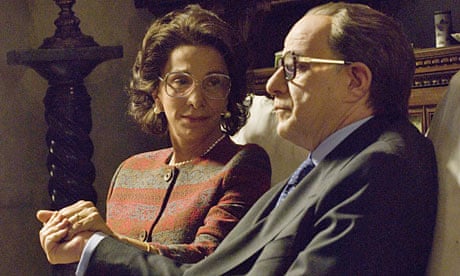In preparation for the hard times now upon us, the jury presided over by Sean Penn at Cannes last May was in an unusually serious and sober mood when they awarded the Palme d'Or to Laurent Cantet's tough look at inner-city schooling in Paris, The Class, and its other two main prizes, the Grand Prix and the Jury Prize, to urgent political movies from Italy, Matteo Garrone's Gomorra and Paolo Sorrentino's Il Divo. All are remarkable films. The most extraordinary, however, though least likely to become a popular success outside its native country, is Il Divo, whose 38-year-old Neapolitan director is confirmed as one of the finest film-makers at work today.
The film's full Italian title is Il Divo: La spettacolare vita di Giulio Andreotti. To call the now 90-year-old statesman, politician and author a "divo" or "superstar" is both accurate and ironic, for on the one hand he has been a dominant, highly controversial figure in Italian and European politics for the past 60 years, while on the other hand he's remained as low key as Clement Attlee in his presentation of self on the public scene.
Italian political cinema these past few years has been dominated by Nanni Moretti whose Aprile and The Caiman launched satirical assaults on that
flamboyant, openly right-wing chancer Silvio Berlusconi. But Moretti's movies are light in tone, the work of a witty, exasperated, politically committed leftist. Sorrentino is a very different kind of film-maker, a grand stylist, dark, obscure, sombre, detached and Andreotti is infinitely more complicated than Berlusconi. If Moretti is opera buffa, Sorrentino is grand opera.
In Sorrentino's second movie, The Consequences of Love (his first, L'Uomo in Più has yet to be shown here), a middle-aged Mafia money launderer lives in a quiet grand hotel in a staid Swiss border town and stylistically it acknowledges a debt to Antonioni. In the next picture, L'Amico di famiglia, where Fellini is the key influence, a 70-year-old hunchback loan shark exploits his neighbours in a town south of Rome where the fascist architecture creates a grandiose, inhuman ambience.
Il Divo renews another major strand in the Italian cinema of the 1960s that emerged out of neorealism, the films of Francesco Rosi. Rosi drew politicallyon Marxism and stylistically on Citizen Kane to probe the connections between the Mafia, corrupt business practice and opaque national politics in such films as Salvatore Giuliano, The Mattei Affair and Lucky Luciano. Superbly impersonated by Toni Servillo (the star of The Consequences of Love), Andreotti lives in dark, penumbral interiors, conducts much of his public work in stately official buildings of classical design and is happiest venturing into the streets during the dark early hours. All three films are atmospherically lit by the gifted cinematographer Luca Bigazzi.
Il Divo begins with the 74-year-old prime minister Andreotti, in politics since 1946, forming his seventh and last Christian Democrat government. We're shown a montage of deaths of prominent people (something that will be repeated later on): assassinations and suicides using bombs, machine guns, pistols, strangulation. His government is introduced to the press and in a stunning sequence his cronies gather for a cabinet meeting. Each is identified on screen by a brief biography and his Cosa Nostra-style nickname and they reveal their characters through their dress and body language.
We're shown Andreotti on one of his nocturnal perambulations, walking on the pavement as three cars crawl along beside him and armed police look warily around. He goes into a church to pray and meets a priest to whom he begins a confession. He's established as a remote, withdrawn figure, wearing horn-rimmed glasses, his ears pixie-like, his mask-like face showing few signs of emotion, his voice flat and expressionless. But his speech is clipped, his talk witty, aphoristic, guarded, at times gnomic.
From this point, the film becomes increasingly fragmented and allusive, as Andreotti's career begins to unravel among renewed accusations of corruption, conspiracy, murder, and association with the Mafia. He fails to be elected president by his fellow senators, is replaced as prime minister and faces numerous trials and tribunals from which he emerges, often on appeal, more or less exonerated, his hands clean only in the Teflon sense.
Did he meet and exchange kisses with the capo di tutti capi Tot ò Riina in Sicily? Was he ultimately responsible for the murders of the banker and fellow mason Calvi, the judge Falcone, the kidnapped former prime minister Aldo Moro and many others? These questions are put to him publicly, in imaginary interrogations and in nightmares, and cleverly brushed aside. Andreotti does not admit responsibility but his extraordinary career raises central questions about how a man can hold office in a corrupt society and serve the interests of the state and its people without supping with the devil or arriving at compromises with evil, venal, antisocial people or at least those with different cultural and economic agendas.
There are fascinating characters here, among them, on the distaff side, Andreotti's wife Livia, withdrawn but critical, who was by profession an archaeologist, his perceptive longtime secretary Vincenza Enea Gambogi, and a strange, uncredited performance as a diplomat's wife by the beautiful Fanny Ardant, who may well have been cast because she several times co-starred with Vittorio Gassman, whose sister was apparently Andreotti's secret passion.
They're elements of an intelligent, elegant movie, part thriller, part analysis of democratic politics, part introduction to the labyrinthine workings of Italian governance. There is much that will mystify foreign audiences, but this mystery cannot be separated from the intricate tapestry of a morally challenging, darkly comic and highly entertaining film.
